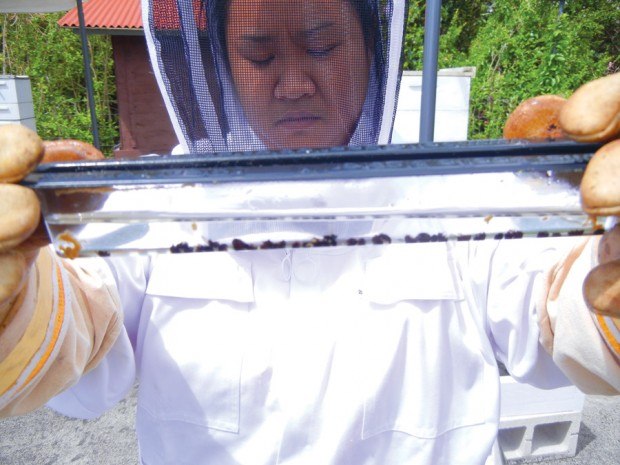PUHI — Kaua‘i beekeepers could sleep in peace, knowing the Garden Isle is the only major Hawaiian island free of the small hive beetle, a serious pest to honeybees. Until last week. On May 24, the Hawai‘i Department of Agriculture
PUHI — Kaua‘i beekeepers could sleep in peace, knowing the Garden Isle is the only major Hawaiian island free of the small hive beetle, a serious pest to honeybees. Until last week.
On May 24, the Hawai‘i Department of Agriculture confirmed what Francis Takahashi, assistant professor at Kaua‘i Community College, already knew for a few days.
“Just taking a look at it, you could tell it was small hive beetle,” said Takahashi of a sample taken by Craig Kaneshige from the Ag Department’s Plant Pest Control Branch.
The beetles were found May 21 at a home in the Pua Loke neighborhood of Lihu‘e, Takahashi said. Kaneshige took hive samples and sent them to HDOA entomologists in Honolulu, who confirmed the pest was the small hive beetle.
The beetle may have spread to the Lihu‘e area, and potentially to other places on the island. Takahashi said more beetles were found in the apiary at KCC, but not before an infected hive was moved to Kapahi.
The small hive beetle was first detected on the Big Island in April 2010, and has since spread to O‘ahu, Maui and Moloka‘i.
Kaua‘i is still considered free of the varroa mite, another serious pest that threatens honeybees. Takahashi said the small hive beetle is more difficult to control because the beetles can live in fruit, while the mite needs bees to survive.
“(Small hive beetle) is not like the varroa mite, that can’t live without the bees,” he said.
Today HDOA officials will come to KCC, and from there they will begin an islandwide survey to try to determine how far the pest has spread on Kaua‘i, Takahashi said.
Meanwhile, Kaua‘i beekeepers are being instructed to take precautions.
“I’ve been calling everybody,” Kilauea beekeeper Debbie Erickson said.
On March 21, Jimmy Trujillo, the head of the Kaua‘i Beekeepers Association, called Erickson to give her a heads-up that the pest may have been found on Kaua‘i.
Erickson said she is building new boxes for her bees and moving her existing hives around in the sun. She said one of the Big Island beekeepers told her that they are using boxes with one side made out of Plexiglas, because the beetle does not like light.
“That’s really scary,” said Erickson, adding that people need to know how important it is to prevent infection and report potential sites.
She said beekeepers can register their hives with HDOA, so state officials can track them and also contact them in case of threats.
As soon as the pest was confirmed, HDOA Apiary Planner Jacquie Robson sent an email to all registered beekeepers on Kaua‘i, providing several links related to the small hive beetle, including one containing control guidelines.
Small hive beetle (Aethina tumida) adults are about four to five millimeters in length and are yellowish-brown in color, turning brownish, then to black at maturity. They feed on most anything inside a bee hive, including honey, pollen and wax, as well as honeybee eggs and larvae.
As they feed, they tunnel through the hive, damaging or destroying the honeycomb and contaminating the honey, according to HDOA.
Symptoms of small hive beetle infestation include discolored honey, an odor of decaying oranges, and fermentation and frothiness in the honey. Heavy infestations may cause honeybee colonies to abandon hives.
The beetle is native to sub-Saharan Africa and was first detected in the United States in 1996 in South Carolina. It was subsequently detected in Florida in 1998 and is currently found in many states in the south and central areas of the U.S. and California.
Besides being honey producers, bees are critical pollinators for many food crops, including melons, watermelons, cucumbers, squash, lychee, mango, macadamia nut, coffee, eggplant, avocado, guava, herbs and some flowering plants, such as sunflowers. HDOA estimated in 2007 that about 70 percent of Hawai‘i’s food crops depend on pollination by bees.
Visit www.hawaii.gov/hdoa for more information.
• Léo Azambuja, staff writer, can be reached at 245-3681 (ext. 252) or lazambuja@ thegardenisland.com.


